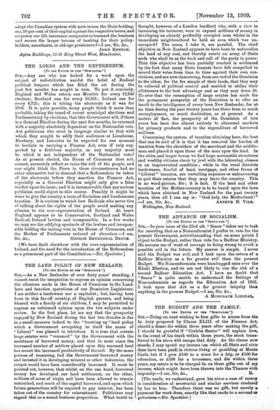THE LAND POLICY OF NEW ZEALAND.
[To THE EDITOR OP THE "SPECTATOR.."] SIR,—As a New Zealander of over forty years' standing, I cannot resist the temptation to express an opinion concerning the allusions made in the House of Commons to the Land- laws and taxation operations of our Dominion Legislature. I am neither a landowner nor a capitalist ; but, having been born in this far-off country, of English parents, and being blessed with a. family of six children, I may be permitted to express an unbiassed opinion upon the two subjects under review. In the first place, let me say that the prosperity enjoyed by New Zealand during the last two decades is due in a small measure indeed to the "bursting up " land policy which a Government arrogating to itself the name of " Liberal " was pleased to introduce. It is true that certain large estates were " resumed " by the Government with the assistance of borrowed money, and that in most eases the increased number of settlers placed upon this resumed land has meant the increased productivity of the soil. By the same process of reasoning, had the Government borrowed money and invested it in developing mineral or other industries, the output would have been considerably increased. It must be pointed out, however, that whilst, on the one hand, borrowed money has developed our land settlement, on the other, millions of acres of virgin soil have been allowed to remain untouched, and much of the capital borrowed, and upon which future generations will be required to pay interest, has been taken out of the country for reinvestment. Politicians may regard this as a sound business proposition. What would be
thought, however, of a London landlord who, with a view to increasing his turnover, were to expend millions of money in developing an already profitably occupied area whilst in the immediate neighbourhood he held an area which was un- occupied? The cases, I take it, are parallel. The chief objective in New Zealand appears to have been to nationalise the land at any cost, and thereby create an army of State serfs who shall be at the beck and call of the party in power. That this objective has been partially reached is evidenced by the fact that many State tenants have felt compelled to record their votes from time to time against their own con- victions, and are now clamouring, from one end of the Dominion to the other, for the fee simple of their lands, that they may be relieved of political control and enabled to utilise their allotments to the best advantage and as they may deem fit. To aver that the resumption of large estates has made for the permanent prosperity of the Dominion is to offer an insult to the intelligence of every born New Zealander, for at no time during the past twenty years has there been so much unemployment, so much destitution, as at present. As a, matter of fact, the prosperity of the Dominion of late years has been due almost entirely to abnormal markets for primary products and to the expenditure of borrowed Concerning the system of taxation obtaining here, the best that can be said of it is that it has removed the burden of taxation from the shoulders of the merchant and the middle- man and placed it upon those of the man upon the land. In the cities and larger towns we find huge mercantile structures and wealthy citizens cheek by jowl with the labouring classes in an impoverished condition ; while in the rural districts landowners, fearful of land, mortgage, and other forms of " Liberal " taxation, are curtailing expenses or endeavouring to quit their estates that they may leave the country. This is no word-picture, Sir ; it is fact. If the land and other taxation of the Mother-country is to be based upon the laws which have obtained in New Zealand for the past twenty years, then all I can say is : " God help the Motherland!"














































 Previous page
Previous page